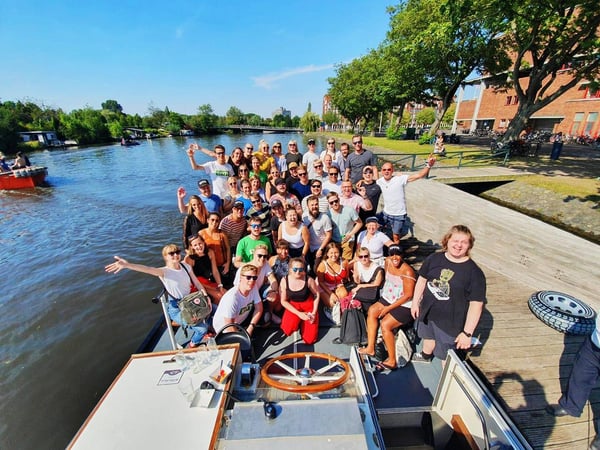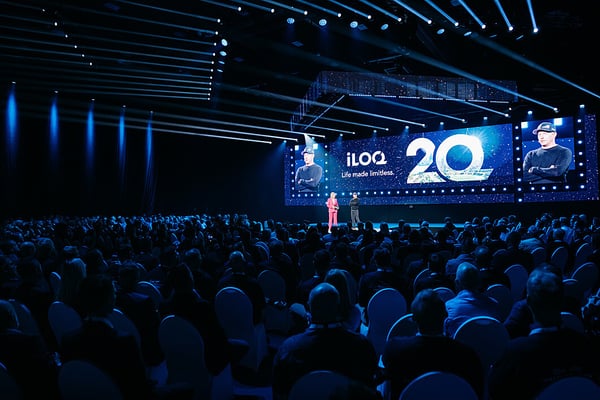Creating a sustainable event involves more than just making eco-friendly choices—it’s about integrating practices that reflect your organization’s values and commitment to sustainability, even in a virtual space. With careful planning, you can design an experience that meets your goals while minimizing environmental impact.
This article offers actionable steps for sustainable event planning, with an emphasis on virtual and hybrid approaches that lower environmental impact by reducing travel and waste. From digital tools to remote participation, learn how to create eco-friendly events that engage attendees while demonstrating your brand’s commitment to sustainability.
Discover tips for live event planning in our guide, 'Live Event Planning: The Ultimate Guide for Successful Events.'
What is Sustainable Event Planning?
Sustainable event planning is about more than reducing waste; it's about designing gatherings that consciously balance environmental responsibility with quality experiences. This method takes into account every element of an event's lifecycle, from planning through to follow-up, aiming to leave the smallest possible environmental footprint.
Sustainable practices in event planning not only show respect for natural resources but also build trust and alignment with attendees who value environmental stewardship.
Virtual event planning represents a significant step forward in sustainable events by removing many of the environmental costs tied to in-person gatherings. With virtual platforms, travel emissions are eliminated, physical resources are reduced, and accessibility is improved, allowing people to participate globally without needing transportation. This shift not only saves resources but also enables organizations to reach a wider audience, creating meaningful engagement with fewer environmental consequences.
By incorporating sustainable practices, organizers create events that reflect their commitment to positive impact, align with audience values, and enhance brand reputation. Sustainable event planning demonstrates that meaningful connections and responsible environmental practices can work hand-in-hand, allowing organizations to create events that are impactful, memorable, and mindful.
Why Sustainable Event Planning Matters?
Sustainable event planning is more than just reducing waste—it’s a holistic approach that benefits both the environment and enhances an organization's brand reputation.
For a well-rounded approach to sustainable event planning, focus on the following areas:
Eco-friendly practices: Reduce paper by going digital and choose virtual or hybrid formats to minimize travel emissions.
Resource conservation: Reduce resource use by limiting physical materials and energy needs, lowering the event’s carbon footprint.
Align with attendee values: Sustainable events resonate with today’s consumers, building rapport with environmentally-conscious attendees.
Positive ripple effect: Eco-friendly events strengthen connections with attendees who value environmental responsibility.
Support CSR: Show a commitment to environmental stewardship, enhancing brand reputation and trust among clients and partners.
Build trust and stand out: Sustainable events set brands apart as forward-thinking and responsible, appealing to a conscientious audience.
By taking these steps, your event doesn’t just succeed—it sets a new standard for environmental responsibility and brand integrity.
“Sustainable events are not just good for the planet; they’re also good for business. When attendees see that an organization is making genuine efforts to reduce waste and minimize impact, it builds trust and makes the experience more meaningful. People want to feel connected to brands that reflect their values.”
– Petri Hollmén, CEO of Lyyti.
Core Practices of Sustainable Event Planning
1. Adopt Digital Event Solutions
Digital event solutions streamline the entire event management process by moving tasks like registration, scheduling, and communication online. This reduces the need for printed materials and reduces waste.
These solutions support sustainable event planning by conserving resources, improving efficiency, and enabling both virtual and hybrid participation options. This approach not only aligns with eco-friendly goals but also enhances the attendee experience with features like real-time updates and digital check-ins.
Lyyti's Invitations & Registrations feature is an excellent example. It helps you replace spreadsheets with an all-in-one attendee management system. With personalized interactions and brand-aligned registration pages, it simplifies participant tracking and data collection.
2. Opt for Sustainable Communication Methods
Opting for sustainable communication methods can be a transformative step in making events more eco-friendly and resource-efficient.
Choosing digital solutions over printed materials—like electronic invitations, digital agendas, and follow-up emails—eliminates the need for physical paper, ink, and mailing resources. This shift not only saves trees but also reduces the energy and emissions associated with producing, transporting, and distributing printed materials.
Digital communications can minimize waste and offer enhanced convenience and engagement. Event planners can automate announcements and reminders, making it easy to update attendees in real-time and ensuring a smooth communication flow before, during, and after the event.
For instance, using SMS notifications or push notifications through event apps keeps participants informed and allows for last-minute updates or adjustments.
Sustainable communication also fosters a more interactive attendee experience, allowing for real-time feedback, quick polls, and instant sharing of event-related content. Attendees can access event materials on their devices, stay connected through interactive event apps, and participate in digital polls, enhancing their overall experience without contributing to waste.
By adopting these digital-first practices, event planners are making a meaningful contribution to a more sustainable future while maintaining a high standard of engagement and convenience.
3. Encourage Remote Participation Options
Remote participation options are essential to sustainable event planning, offering a powerful way to reduce the environmental impact of events. By allowing attendees to join virtually, event organizers can significantly decrease the need for travel, which is one of the largest contributors to an event’s carbon footprint.
When attendees participate remotely—whether through live streaming, on-demand webinars, or a mix of virtual and in-person (hybrid) formats—the environmental costs associated with transportation, accommodation, and resource consumption for in-person attendance are minimized.
Virtual and hybrid models not only reduce emissions but also make events accessible to a broader, more diverse audience. Attendees who may have faced logistical, financial, or physical barriers to travel can now participate fully, ensuring inclusivity without the environmental toll.
This flexibility also enables organizers to scale their events, potentially reaching a global audience while maintaining a small environmental footprint. For instance, hybrid formats allow in-person attendees to benefit from networking and face-to-face interactions, while remote participants engage through high-quality digital experiences.
Platforms like Lyyti make it easy to create engaging, branded online events and webinars. They support sustainable event planning by enabling live interaction, customized registration pages, and integrated feedback collection.
These features help remote attendees stay connected and engaged, fostering a seamless and inclusive event experience from anywhere.
4. Optimize for Minimal Paper Use
Going paperless is a crucial step toward sustainable event planning, as it allows organizers to manage all aspects of an event without relying on physical materials. By using digital platforms, event planners can handle everything from check-ins to schedules and feedback collection seamlessly, reducing waste and creating a more efficient process.
This transition also makes it easier to provide real-time updates and information to attendees, who can access all event details directly on their devices, whether through a link, QR code, or event app.
Digital solutions offer several effective paper-saving options. QR codes, for example, can replace printed tickets, making the check-in process faster and reducing the need for paper.
Likewise, schedules, speaker bios, and other materials can be distributed as digital handouts, eliminating printed programs. This approach not only minimizes waste but also enhances accessibility, as attendees have important information at their fingertips.
Additionally, digital tools simplify feedback collection, as post-event surveys and follow-ups can be distributed electronically. This not only prevents waste from paper forms but also enables faster data collection and analysis, which is beneficial for planning future events.
5. Select Ethical Giveaways and Digital Alternatives
Sustainable event planning extends to choosing environmentally friendly giveaways and considering digital alternatives. Traditional event swag, like plastic water bottles or disposable bags, often ends up in landfills, creating unnecessary waste. Instead, planners can opt for eco-friendly, reusable items made from recycled or sustainable materials.
This choice reflects an organization’s commitment to environmental responsibility and provides attendees with useful, sustainable products that they’re likely to use beyond the event.
Digital alternatives, like e-gift cards, downloadable resources, or virtual swag bags, further reduce the physical waste generated by giveaways. Offering digital swag provides value to attendees without creating waste and allows for customization. Additionally, selecting vendors committed to sustainable practices in manufacturing and sourcing adds another layer of ethical consideration to the event. By choosing ethical merchandise, planners can offer attendees thoughtful, eco-conscious gifts that contribute positively to the event experience.
Choosing ethical vendors who prioritize sustainability is an essential part of creating a truly sustainable event. This approach not only enhances the event’s environmental responsibility but also supports businesses that share a commitment to eco-friendly practices.
Selecting giveaways with this level of consideration helps event planners align with broader sustainability values, enhances brand reputation, and reinforces a dedication to positive environmental impact.
6. Promote Sustainability Education and Awareness
Adding an educational component to your event can engage attendees and deepen their commitment to sustainability. You can organize short, impactful workshops or interactive sessions that provide attendees with practical tips for reducing their environmental impact.
These could range from sessions on reducing energy use at home to managing waste effectively or opting for eco-friendly travel methods. Virtual breakout rooms for small group discussions on green practices can also foster a sense of community around sustainable actions.
Provide attendees with digital resources, such as e-guides on sustainable lifestyle practices or information on the environmental impact of different habits, which they can revisit long after the event.
Consider including brief sustainability tips throughout the event, like displaying eco-friendly reminders or resource-saving suggestions between sessions. By introducing attendees to actionable ways they can contribute, your event creates a ripple effect, empowering participants to carry the sustainable practices they learn into their daily lives.
Conclusion
Sustainable event planning offers substantial benefits for reducing environmental impact while also enhancing a brand’s reputation as socially responsible and forward-thinking. By embracing eco-friendly practices, such as reducing waste and promoting virtual attendance, organizers can demonstrate their commitment to sustainability, appealing to environmentally conscious attendees and clients.
Taking incremental steps toward sustainability—whether through digital communication, virtual event options, or responsible resource management—can make a significant difference. Even small changes add up over time, contributing to a larger positive impact on the environment.
For those looking to streamline their journey toward more sustainable events, Lyyti’s event management platform offers comprehensive tools to support eco-friendly practices from planning to post-event feedback.
Book a demo today to discover how Lyyti can help make your events more impactful and eco-friendly.
FAQ
What is sustainable event planning?
Sustainable event planning focuses on organizing events that minimize environmental impact. This involves reducing waste, managing resources responsibly, and offering virtual participation options to lower carbon emissions.
How can virtual and hybrid events support sustainability?
Virtual and hybrid events reduce travel needs, significantly lowering carbon emissions. They also minimize the requirement for physical materials, making events more eco-friendly while still allowing high levels of engagement.
Why are digital event solutions important for sustainability?
Digital platforms streamline planning by moving processes like registration, communication, and data collection online. This reduces the need for paper, conserves resources, and supports efficient event management with lower environmental impact.
What types of sustainable giveaways are recommended?
Eco-friendly giveaways, such as reusable items made from recycled materials, or digital alternatives like e-gift cards, reduce waste. Ethical swag options align with sustainability values and demonstrate a commitment to environmentally responsible practices.
How can Lyyti’s platform help with sustainable event planning?
Lyyti provides tools for virtual event hosting, automated communication, and online registration, supporting eco-friendly planning from start to finish. Create engaging & branded online events & webinars with Lyyti to reduce your event’s carbon footprint.








